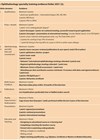Ophthalmology speciality training is currently seven years in the UK without an additional fellowship. UK trainees are privileged to have a training programme that is held in high esteem across the world, but did you ever wonder what other trainees get up to, and how we compare, to the rest of the world?
I got in touch with friends and former colleagues who have trained abroad to try and find out more. Seven ophthalmologists from Pakistan, Zimbabwe, Morocco, Greece, USA and Australia, who are currently in training or recently finished training in their home country, completed a questionnaire on their training experience.
Although the above numbers may vary, the participants felt that they were largely representative of the average trainee from their respective countries.
Ophthalmology training usually ranged from four to five years in duration. Australian trainees had a subspeciality focused year in their fifth year of training and commonly undertook a further fellowship. US trainees reported a growing trend towards post-residency fellowships. This raises the question of whether the training programme in the UK is too long, although a survey of trainees published in 2019 suggested that two thirds of trainees did not favour this [2].
All participants reported that cataract and glaucoma were most commonly seen, followed by diabetic retinopathy, vascular occlusions and age-related macular degeneration. Trainees from developing countries reported more frequent anterior segment pathology, amblyopia, trauma and uveitis. All trainees commended the amount of pathology they were exposed to during their training, and having plenty of opportunity for learning and research. Areas of improvement focused on busy on-call shifts, frequent relocation during training, lack of structured training, and lack of equipment, which limited adoption and exposure to newer treatments.
Annual leave varied from 10 to 28 days, while study leave varied from 0 (where study leave was not separated from annual leave!) to once a week. Gross pay per month ranged from £80 (Zimbabwe) to £5450 (Australia).
Looking at these results, it is clear that differences in demographics, pathology and resources, play a huge part in shaping training around the world. It also highlights that there are plenty of opportunities to collaborate with our international trainee colleagues to augment our own training experience.
A massive thank you to Dr Bilal Ashraf, Dr Theodora Stavropoulou, Dr Chih-Hung (Nelson) Kuo, Dr Nathan Nielsen, Dr S Amal Hussnain, Dr Asmaa Elamrani and Dr Simbarashe Muvambwi for sharing their trainee experiences.

References:
1. Guide for delivery of Ophthalmic Specialist Training (OST) Version 3.5. June 2018:
https://www.rcophth.ac.uk/wp-content/
uploads/2018/09/RCOphth-Guide-for
-delivery-of-OST-version-3.5-June-2018.pdf
Last accessed June 2020.
2. Dean WH, Grant S, McHugh J, et al. Ophthalmology specialist trainee survey in the United Kingdom. Eye [online] 2019;33(6):917-24.
COMMENTS ARE WELCOME










